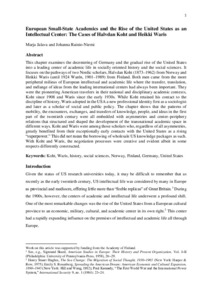European Small State Academics and the Rise of the United States as an Intellectual Center: the Cases of Halvdan Koht and Heikki Waris
Jalava Marja; Rainio-Niemi Johanna
https://urn.fi/URN:NBN:fi-fe2021042719710
Tiivistelmä
This chapter examines the decentering of Germany and the gradual rise of the United States into a leading center of academic life in socially oriented history and the social sciences. It focuses on the pathways of two Nordic scholars, Halvdan Koht (1873–1962) from Norway and Heikki Waris (until 1924 Warén, 1901–1989) from Finland. Both men came from the more peripheral milieus of European intellectual and academic life where the transfer, translation, and mélange of ideas from the leading international centers had always been important. They were the pioneering American travelers in their national and disciplinary academic contexts, Koht since 1908 and Waris since the early 1930s. While Koht retained his contact to the discipline of history, Waris adopted in the USA a new professional identity first as a sociologist and later as a scholar of social and public policy. The chapter shows that the patterns of mobility, the encounters, exchanges, and transfers of knowledge, people, and ideas in the first part of the twentieth century were all embedded with asymmetries and center–periphery relations that structured and shaped the development of the transnational academic space in different ways. Koht and Waris were among those scholars who, regardless of all asymmetries, greatly benefited from their exceptionally early contacts with the United States as a rising "superpower." This did not mean the borrowing of wholesale US knowledge packages as such. With Koht and Waris, the negotiation processes were creative and evident albeit in some respects differently constructed.
Keywords: Koht, Waris, history, social sciences, Norway, Finland, Germany, United States
Kokoelmat
- Rinnakkaistallenteet [29255]
